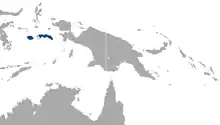Lesser tube-nosed bat
The lesser tube-nosed bat (Nyctimene minutus) is a species of megabat in the family Pteropodidae. It is native to two of the Maluku Islands (Spice Islands) in northern Indonesia.
| Lesser tube-nosed bat | |
|---|---|
| Scientific classification | |
| Kingdom: | Animalia |
| Phylum: | Chordata |
| Class: | Mammalia |
| Order: | Chiroptera |
| Family: | Pteropodidae |
| Genus: | Nyctimene |
| Species: | N. minutus |
| Binomial name | |
| Nyctimene minutus K. Andersen, 1910[2] | |
 | |
| Lesser tube-nosed bat range | |
Taxonomy
The lesser tube-nosed bat was described as a new species in 1910 by Danish mammalogist Knud Andersen. The holotype had been collected by Alfred Russel Wallace in Tondano, Indonesia.[2] Two subspecies are recognized, with Andersen also the taxonomic authority: N. m. minutus and N. m. varius.[3]
Description
The lesser tube-nosed bat has a forearm length of approximately 51 mm (2.0 in).[2]
Range and habitat
The bat is endemic to the mountainous forests of Buru and Seram Islands, in Maluku Province. It is not found on nearby Ambon Island. It has been documented at a range of elevations from 700–900 m (2,300–3,000 ft) above sea level. Its habitat is mid-montane forests.[1]
Conservation
As of 2008, it is evaluated as a vulnerable species by the IUCN. It meets the criteria for this designation because it has a small area of occupancy, at less than 2,000 km2 (770 sq mi). Additionally, it has experienced severe habitat fragmentation, and its habitat is continuously declining in both quality and extent. Its population is likely decreasing.[1]
References
- Hutson, A.M.; Helgen, K.; Schlitter, D. & Suyanto, A. (2008). "Nyctimene minutus". IUCN Red List of Threatened Species. 2008: e.T14960A4483524. doi:10.2305/IUCN.UK.2008.RLTS.T14960A4483524.en.
- Andersen, Knud (1910). "LXX.—Ten new Fruit-bats of the genera Nyctimene, Cynopterus, and Eonycteris". Annals and Magazine of Natural History. 8. 6 (36): 621–625. doi:10.1080/00222931008692896.
- Kitchener, D. J.; Packer, W. C.; Maryanto, I. (1993). "Taxonomic status of Nyctimene (Chiroptera: Pteropodidae) from the Banda, Kai and Aru Islands, Maluku, Indonesia–implications for biogeography" (PDF). Records of the Western Australian Museum. 16 (3): 399–417.
